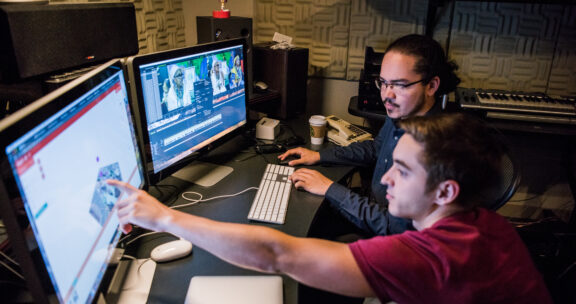
UMBC Interdisciplinary CoLab: Paid Narrative-based Internship
CoLab is an in-person, paid summer internship in narrative-based research for UMBC undergraduates. Held during Summer Session One, student interns will work on interdisciplinary project teams to conduct research, create effective narratives, and develop public-facing final products that support the goals of on and off campus community-engaged organizations and scholars. Open to all majors, this is an excellent opportunity for students in STEM fields to learn to tell effective stories and for students in social science and humanities fields to gain research and technical skills.
Participants who successfully complete the internship receive a $3000 stipend and a tuition scholarship for the 3-credit internship course.
Program Dates
CoLab 2025 will be held during Summer Session One and meets in-person from Monday, June 2nd through Friday, June 27th. PLEASE NOTE: During these dates, student interns are required to dedicate Monday through Friday from 9:30 am – 4:00 pm to the in-person, on-campus internship. Participants will have preparatory work to complete on their own the week prior to the in-person start date of 6/2, and a final reflective paper to submit the week following the final in-person date of 6/27.
Summer 2025 Projects
1. On Our Own of Maryland
Project Leader: Dr. Lindsay DiCuirci, English
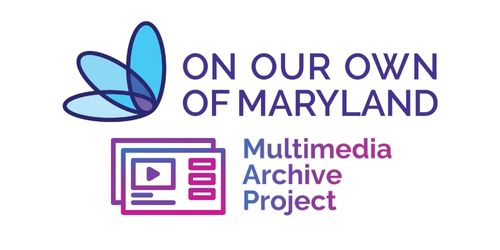 On Our Own of Maryland, Inc. (OOOMD) is a statewide peer-operated behavioral health advocacy and education organization which promotes equality, justice, autonomy, and choice about life decisions for individuals with mental health and substance use needs. Since 1992, OOOMD has worked with peers, service providers, community leaders, local and state political leadership, and professional and community organizations to ensure that behavioral health services and systems are recovery-oriented, trauma-informed, person-centered, and culturally and linguistically responsive.
On Our Own of Maryland, Inc. (OOOMD) is a statewide peer-operated behavioral health advocacy and education organization which promotes equality, justice, autonomy, and choice about life decisions for individuals with mental health and substance use needs. Since 1992, OOOMD has worked with peers, service providers, community leaders, local and state political leadership, and professional and community organizations to ensure that behavioral health services and systems are recovery-oriented, trauma-informed, person-centered, and culturally and linguistically responsive.
The interdisciplinary student project team will review and analyze materials from OOOMD’s archive of audio, video, and print matter which capture 30 years of community organizing and milestone accomplishments in Maryland’s mental health peer community. Based on this research, the team will produce videos and infographic sheets that communicate OOOMD’s innovations and effectiveness in community-led advocacy and service provision.
Recommended skills, abilities, and interests for applicants
Student members of the interdisciplinary team should share the following: intellectual curiosity, strong written and oral communication skills, solid research skills, and the ability to work both collaboratively and independently.
Additionally,
- Personal/Social: Passion for community-led initiatives, appreciation of behavioral health support as essential to holistic wellbeing (personal experience with mental health and/or substance use recovery preferred), interest in the role of advocacy for systems change and social justice.
- Technical: No individual team member needs to have each of these technical skills; however, collectively the team will need demonstrated skills in: storytelling, persuasive writing, video production, graphic design, and project management.
2. Lights, camera, archives! Creating video-based instruction tools for novice researchers in Special Collections and Archives
Project Leaders: Lindsey Loeper and Susan Graham, Albin O. Kuhn Library & Gallery
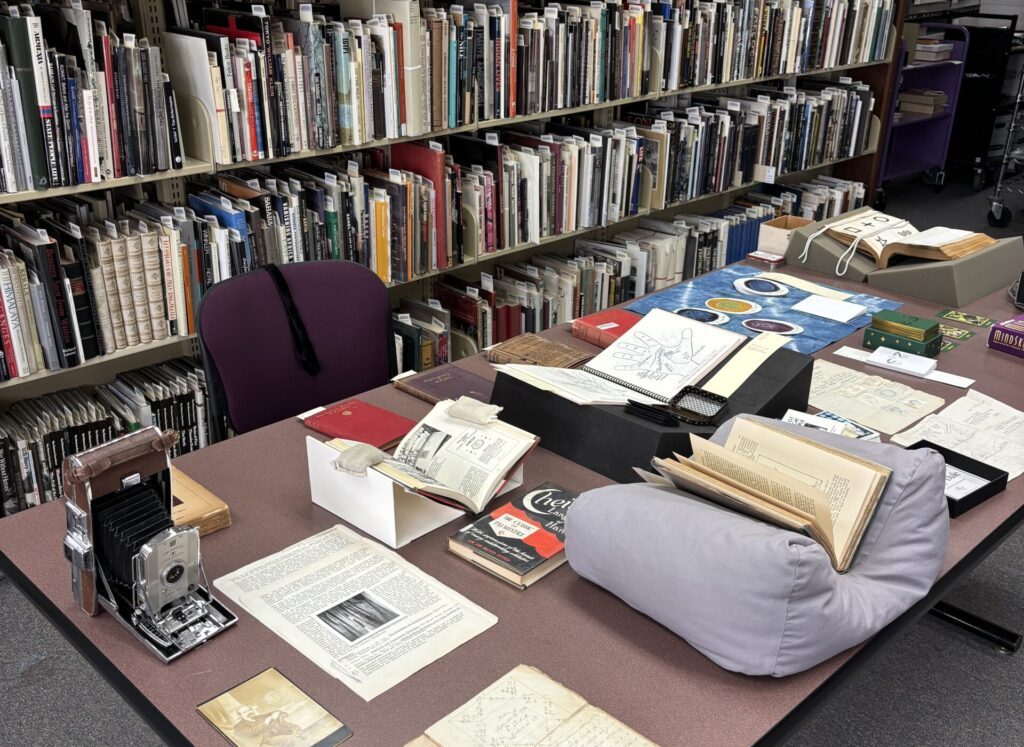 UMBC’s Special Collections contain a wealth of unique, one-of-a-kind resources for students to use in research, including photographs, books, archives, and more related to topics such as the history of photography, Maryland folklife, parapsychology and the occult, science fiction, biological sciences, alternative press, radical literature, and UMBC history. Using these materials for the first time can be intimidating. The interdisciplinary team of students will create introductory and instructional videos aimed at easing the anxiety of new researchers.
UMBC’s Special Collections contain a wealth of unique, one-of-a-kind resources for students to use in research, including photographs, books, archives, and more related to topics such as the history of photography, Maryland folklife, parapsychology and the occult, science fiction, biological sciences, alternative press, radical literature, and UMBC history. Using these materials for the first time can be intimidating. The interdisciplinary team of students will create introductory and instructional videos aimed at easing the anxiety of new researchers.
The project team will examine the research experience, including learning about collection holdings, working in the reading room, information-seeking behavior, wayfinding techniques, visual and archival literacy, the department’s rules, and how to ask for help. Team members will be trained in video production techniques, learn to use video equipment, and have access to the breadth of resources in the Special Collections to make engaging, visually interesting, and informative videos that help researchers feel prepared, comfortable, and welcome using Special Collections materials. The videos produced by the project team will be hosted on the UMBC Special Collections website and shared during instruction sessions.
Recommended skills, abilities, and interests for applicants
Student members of the interdisciplinary team should share the following traits: intellectual curiosity, the ability to work both collaboratively and independently, openness to new ideas, creativity, a willingness to lead sections of the project, solid research skills with interest in archival research, and confidence in learning and exploring technology related to video creation and editing.
Additionally,
- at least one team member should have experience with graphic design or examples of art or design work,
- and at least one team member should have completed course work with archival research requirements or have attended a visual or archival literacy session in Special Collections.
3. Storytelling through Baltimore Album Quilts
Project Leader: Dr. Sarah Fouts, American Studies
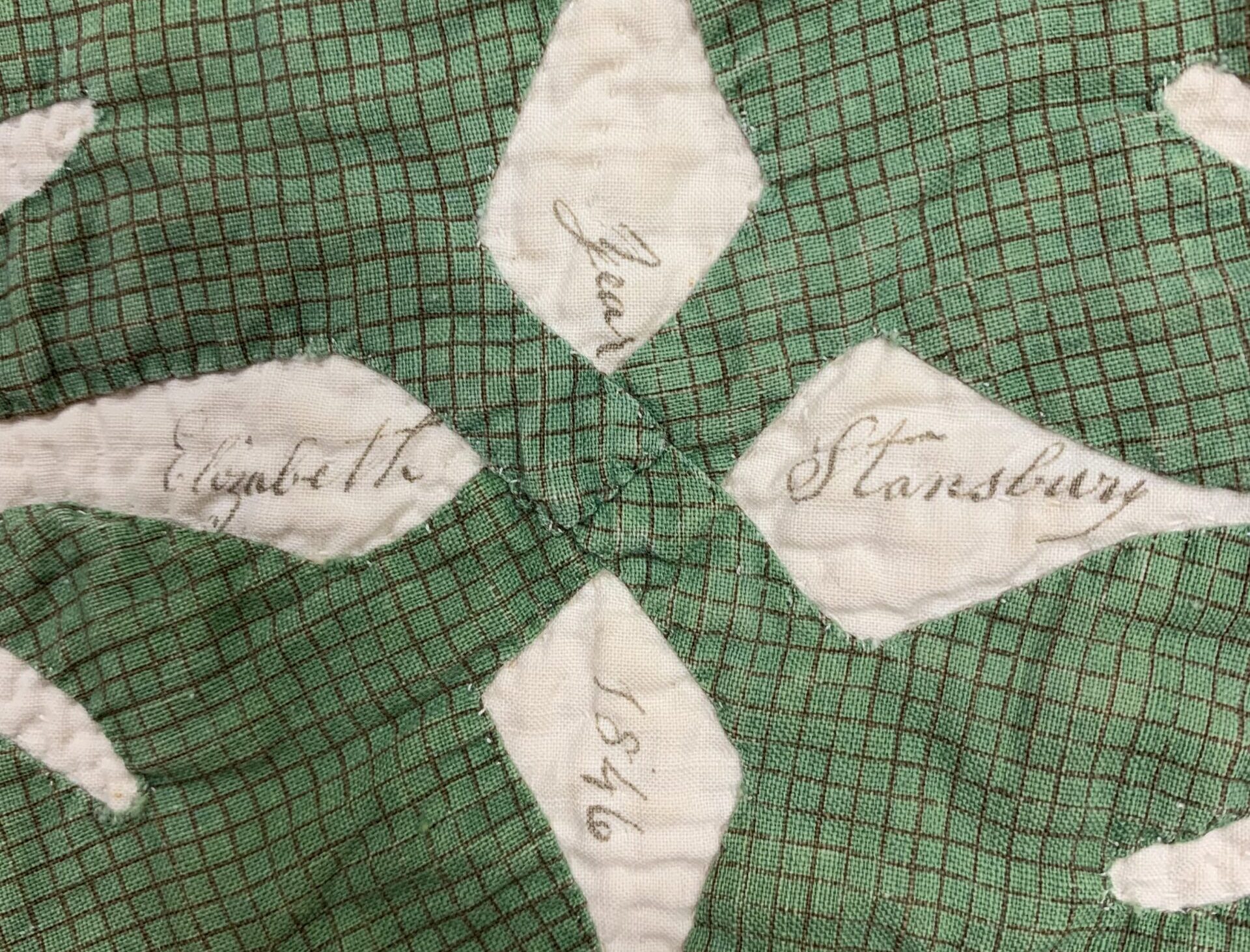 How do symbols and motifs in Baltimore Album Quilts commemorate events and represent their time period? What stories can the applique blocks and indelible ink tell us about the quiltmakers and their families? How can we help recreate this quilting history? Is there anything inherently political about quilting and other textile arts?
How do symbols and motifs in Baltimore Album Quilts commemorate events and represent their time period? What stories can the applique blocks and indelible ink tell us about the quiltmakers and their families? How can we help recreate this quilting history? Is there anything inherently political about quilting and other textile arts?
This interdisciplinary team of students will document the history of Baltimore Album Quilts, threading together topics of Maryland history, textile design, place, and identity. This important quilting tradition emerged in the Maryland region between the 1840s and 1850s and flourished far beyond the state. Interweaving archival research and oral histories, students will explore the artistry along with the familial and community connections behind these quilts. Under the guidance of quilt expert and UMBC Founding Four alum, Mimi Dietrich, as well as members of the Stansbury family (key family in creation and preservation the quilts), undergraduate researchers will investigate the archives, designs, materials, and collaborative processes involved in creating this material culture to stitch together information about Baltimore Album Quilts. Archival research will involve examining historical records, photographs, and documents from sources such as the Library of Congress, Maryland State Archives, Maryland Historical Society, and the Maryland Quilt Heritage Project. Additionally, oral history interviews will trace and document personal stories, family histories, and knowledge about quilt-making traditions.
Recommended skills, abilities, and interests for applicants
Student members of the interdisciplinary team should share the following traits: intellectual curiosity, strong written and oral communication skills, leadership ability, the ability to work both collaboratively and independently, and solid research skills with interest in archival research and oral history.
Additionally,
- at least one team member should have an interest and ability to conduct in person interviews;
- one team with audio editing is preferred;
- and at least one team member familiar with interpreting historical documents, photographs, and 19th-century American social and cultural history will enhance the research process.
- Students with an interest in material culture, textile design, and/or fiber arts are encouraged – no sewing background necessary!
4. Indigenous Voices: Exhibiting Stories from Latin America at The Walters Art Museum
Project Leaders:
Dr. Renée Lambert-Brétière, Modern Languages, Linguistics & Intercultural Communication
Edgar Reyes, Visual Arts
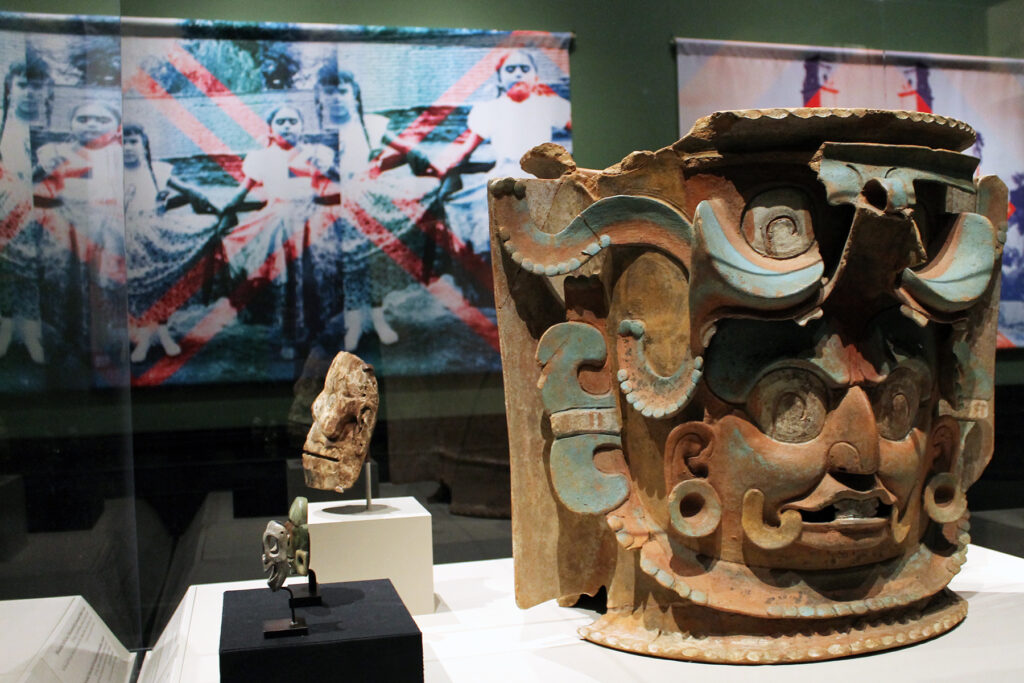 The interdisciplinary team of student researchers will work with staff from The Walters Art Museum to share stories and cultural traditions from Indigenous community members in reflection of the museum’s upcoming exhibition, “Latin American Art / Arte Latinoamericano.” The exhibit will showcase over 200 artworks from South, Central, Meso America, and the Caribbean. This CoLab project aims to go beyond the material aspects of these artworks and incorporate the intangible elements of Indigenous cultures, such as language, history, and tradition. By exploring the diverse perspectives of indigenous communities, students will create a more comprehensive understanding of the art and culture of the region.
The interdisciplinary team of student researchers will work with staff from The Walters Art Museum to share stories and cultural traditions from Indigenous community members in reflection of the museum’s upcoming exhibition, “Latin American Art / Arte Latinoamericano.” The exhibit will showcase over 200 artworks from South, Central, Meso America, and the Caribbean. This CoLab project aims to go beyond the material aspects of these artworks and incorporate the intangible elements of Indigenous cultures, such as language, history, and tradition. By exploring the diverse perspectives of indigenous communities, students will create a more comprehensive understanding of the art and culture of the region.
Students will dive into the historical and contemporary significance of Indigenous languages and cultures, and engage with community members to gather their stories, experiences, and perspectives on the artworks. Depending on skill sets students will develop an online documentation through videos and audio recordings to share the stories of community members to a public audience. The goal is to create a printed and digital pamphlet that introduces the project, provides context for the artworks, and includes QR codes to access the multimedia content.
Recommended skills, abilities, and interests for applicants
Student members of the interdisciplinary team should share the following traits: intellectual curiosity, strong written and oral communication skills, leadership ability, solid research skills, and the ability to work both collaboratively and independently.
Additionally,
- all student members should come to the project with an interest in museum studies, digital storytelling, and archival research;
- at least one team member should have competence in Spanish to talk to community members who might not be comfortable with English;
- one team member should have some experience with audiovisual production, and digital storytelling;
- and one team member should be familiar with graphic design and/or have a desire to learn software such as Canva.
5. People and Places of Baltimore - An Audio Tour of the Historic Zion Church of the City of Baltimore
Project Leaders:
Susanne Sutton and Talke Macfarland – Modern Languages, Linguistics, & Intercultural Communication

(image: Zion Lutheran Church of Baltimore, founded 1755)
The Zion Church of the City of Baltimore, which today is located at 400 E. Lexington Street in downtown Baltimore, is one of the oldest churches in the city. It was founded in 1755 as “The Evangelical Lutheran Congregation at Baltimore Town” to serve Baltimore’s German immigrant community. Throughout its over 250-year history, pastors and congregations left their mark on Zion as they led efforts to expand the church, to add a school, or to rebuild it after a fire in 1840 partially destroyed the sanctuary. The interior of the church and its various connected buildings also tell Zion’s story through the centuries. Since 2011, the Zion Church of the City of Baltimore has been listed on the National Register of Historic Places in Central Baltimore.
The goal of this project is to produce an audio narrative tour of this historic Church to modernize the visitor experience, appeal to a wider audience, and increase interest in the church as a central institution in Baltimore. The interdisciplinary project team will discuss options with church leaders, examine historical resources, use appropriate technological tools, and collaborate to develop a series of audio narratives that can be accessed by anyone interested in visiting this historic Baltimore site. Church leaders envision a tour through which the history of the church comes alive through recorded audio narrative that could be accessed via cell phone technology.
Recommended skills, abilities, and interests for applicants
Student members of the interdisciplinary team should share the following
traits: intellectual curiosity, interest in Baltimore’s history and (German)
immigration history, strong written and oral communication skills, solid
research skills, ability to work both independently and as a team member, and
a willingness to lead sections of the project.
Additionally,
- at least one member of the project team should have some experience with sound editing,
- and one team member should have a background in web design.
Application requirements
- To apply, you must be a UMBC degree-seeking undergraduate student, have completed at least 30 credits at UMBC, and you must submit an unofficial UMBC transcript with your application. Transfer students who have completed at least one semester of coursework at UMBC and at least 30 total college credits may apply and include their transcript from their previous college or university.
- Your transcript must indicate that your UMBC cumulative grade point average is 3.20 or greater.
- The review committee will only consider applications that meet the minimum qualifications and requirements. However, selection for this internship is competitive; therefore, meeting the minimum qualifications does not guarantee your selection.
- You must complete the full application and answer all questions.
The Application is now open and closes at 8pm on Wednesday, March 26, 2025.
Want to see more CoLab? Learn more about the program and look at what past students accomplished during their internships! See Past Projects.
Questions
Please contact Dr. Rachel Carter at rachc1@umbc.edu.
The UMBC Interdisciplinary CoLab program is a partnership between The Office of Summer, Winter & Special Programs; the Dresher Center for the Humanities; and the Provost’s Interdisciplinary Activities Advisory Committee.